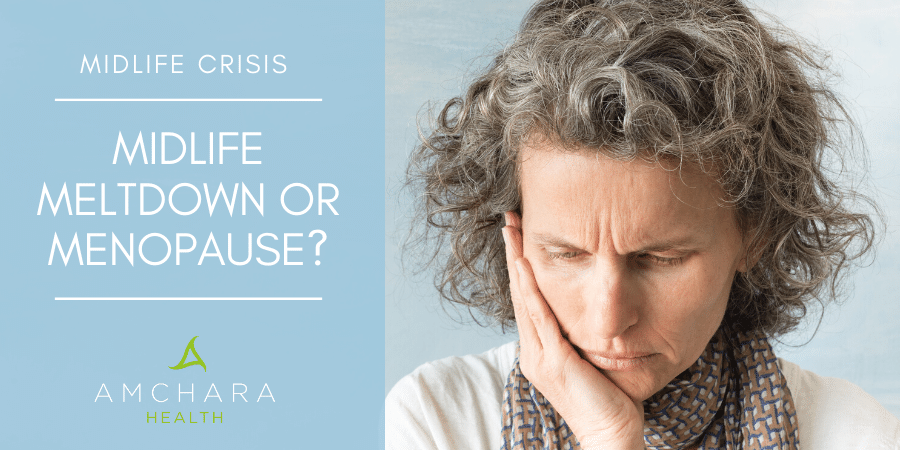Are you a woman of ‘a certain age’? Do you sometimes experience irrational, and often unfounded, thoughts or emotions? Do you find you can react before thinking?
If you answered yes to any one of these questions then rest assured you aren’t alone. I will hold my hand up and confess to saying yes to all of the above questions, as I am sure many other women will too.
The way in which I react, think or feel has been changing gradually, and quite often I am unable to put my finger on an obvious reason or trigger for the way I reacted or felt. With nothing to explain why I am periodically irrational or dissatisfied, I now have found myself wondering if I am having a mid-life crisis!
It has taken me some time to reach the conclusion that there may be biological factors contributing to how I feel. After much research I now suspect that menopausal changes are contributing to my perceived mid-life crisis. In this article I will share my discoveries and explain how early menopausal changes can impact mental health.
Perimenopause
A woman’s loss of reproductive function doesn’t happen overnight and the run up to periods ending is defined the perimenopause. Technically the term menopause refers to a full 12 months without periods. Having spoken to several other women, and looked into the clinical evidence, the length of the perimenopause varies for different women – it may take between 4 and 10 years. With the average age of menopause being 51, this means that the perimenopause can begin in the early 40s.
Early warning signs
For some women there can be early changes in the menstrual cycle, periods may become heavier or lighter and cycle length can be inconsistent – either shorter or longer. Often the physical signs of hormonal changes, like hot flushes and night sweats, actually appear in the latter part of the perimenopause when hormone levels rapidly drop.
The early part of the perimenopause may result in few physical symptoms but it does seem to bring many psychological changes. Hormonal alterations and the emergence of niggling emotions and feelings may also be occurring right at a time when a woman may be experiencing several challenges in life.
A woman in her 40s may have to deal with many family issues, such as older children flying the nest, younger children going through exams, or starting a family later in life. It can be a time of life where there may be marital changes, stress at work, concerns about direction in life, and changed responsibilities such as caring for ageing parents.
Taking all of this information on board, it now makes sense to me why I may be attributing my feelings to stress or a mid-life crisis! I am sure I am not alone, there may be many other women in a similar situation.
Gradual shift in mindset
With the exception of a few conditions, alterations to mental health are rarely sudden and there is usually a gradual build up to noticeable changes. It has taken me 18 months to finally accept that I do not feel, think or react in the same way I did 5 years ago.
Irritability, irrational thinking and overreacting stand out as some of the first changes in my own mental health. These feelings have persisted and if you asked me to explain why I was irrational or irritable I would be unable to give you a good reason.
I am interested in the effects of sleep and at one point I wondered if a lack of sleep or disrupted sleep makes me more irritable. Looking back, I found that on some days it did increase my irritability, but then there were the days that I had a great night’s sleep only to wake up completely intolerant of everything and snappy. So, I came to the conclusion that it was more than just disrupted sleep affecting me.
If being irritable and irrational weren’t enough to deal with, mood swings, anxiety and a general dissatisfaction with life popped up to join in. I have also developed a low tolerance threshold – for everything – and have become impatient. Another obvious change has been the fact that I am unable to filter out what I say and just say what I think!
How does perimenopause affect the mind?
- Female hormone fluctuation
Women are twice as likely to develop mental health problems compared to men which may be because of several factors. Female hormones such as oestrogens are known to offer protective effects for neurons and impact brain functioning. They can influence areas of the brain that control cognitive function, motor skills and mood (1).
During hormonal fluctuations, like the natural menstrual cycle or perimenopause, some of oestrogens’ benefits to brain function can be diminished. A common example of this is the appearance of mood fluctuations in PMS.
During the perimenopause there can be significant changes to a hormone called follicle stimulating hormone (FSH), alongside alterations to oestrogens. It seems these changes may trigger mood disorders like depression in the perimenopause (2). In fact, research shows that perimenopausal women are four times more likely to experience clinically significant symptoms of depression (3) and it is more likely to occur in the early part of perimenopause and improve closer to menopause – I find these facts quite compelling.
It is worth noting that depression is not only signified by a persistent low mood, but irritability, anxiety, nervousness and dysphoria (dissatisfaction with life) are also common.
After reading this information I now wonder if my FSH and oestrogen fluctuations are playing a role in my symptoms.
- Stress
I also considered the impact of stress on my own mental health. Like most working mums, life can be challenging sometimes and I will own up to having been under stress for a while. Could this be the cause of how I felt rather than hormone fluctuations?
There is considerable evidence to show that chronic stress has negative effects on mental health and stress management therapies, such as mindfulness based cognitive therapy, can reverse symptoms (4).
It turns out a combination of both stress and female hormone alterations may play a role. Fluctuations in female hormones alter the stress response and in effect cause it to overreact; this can lead to an increase in stress hormones like cortisol (5). The link between stress, anxiety and depression incidence may be down to the impact of high cortisol (6).
With reduced stress resilience during a challenging time of life, it may be no surprise that even small stressors can trigger a large stress response, and an overreaction like anxiety or irrational behaviour.
Putting it into perspective
Delving into the evidence behind mental health and the perimenopause has made me more aware of how women in their 40s are more susceptible to developing psychological issues.
If so many women are developing depression and anxiety, or suffering the effects of stress in the perimenopause, why isn’t there an awareness campaign surrounding mental health in perimenopause?
I find that knowing there may be a biological reason for the appearance and exacerbation of my symptoms reassuring. Although my hormones will probably continue to fluctuate for some time, and so perhaps will my moods and mental state, I am now more aware of how I react and spend less time criticising myself because of it.
I am taking a proactive approach and maintaining a hormone balancing diet rich in fibre, beans, lentils, fruits and vegetables, alongside quality protein to support blood sugar and stress.
My aim moving forward is to incorporate more stress management to nurture my parasympathetic nervous system (the calming side) to counter-effect the overreactive sympathetic nervous system (the fight/flight side). Yoga, breathing techniques and meditation all enhance parasympathetic activity.
Takeaway
Many factors can contribute to a change in mental health. Women over the age of 40 may be more susceptible to hormone fluctuations that lead to an increased risk of depression, anxiety and stress. Although these hormone fluctuations are inevitable during the perimenopause, the effects on mental health can be tackled and symptoms improved.
If you would like to know more about your female hormone levels, or discuss your mental health, a consultation with an Amchara Personalised Health practitioner can be beneficial. A unique programme, tailored to your needs and based on the results of functional tests can be devised.
This doesn’t need to be the end of the article. With your comments we’d love to continue the conversation.
Let us know your experiences of the perimenopause. Do you struggle with irritability or anxiety?
We value your experience and knowledge and hope you will share your solutions with others.
Please leave your comments below.
Read this next:




